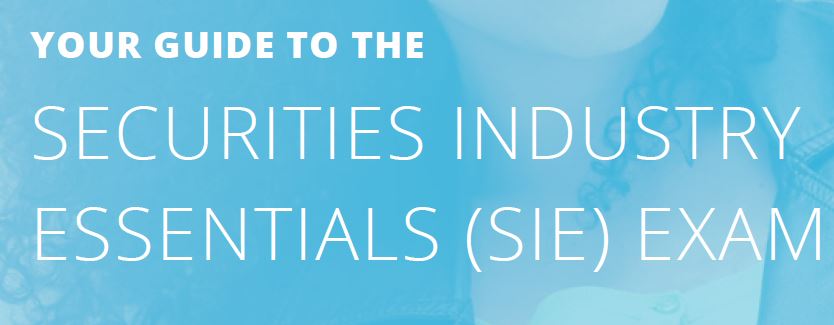Securities Industry Essentials (SIE) Exam: Frequently Asked Questions for Businesses

The introduction of FINRA’s Securities Industry Essentials (SIE) exam in October 2018 fundamentally changed the securities licensing process. Today, firms continue to navigate these changes, benefiting from the restructuring while adapting their strategies. We've compiled and answered some of the most common questions we hear from our partner firms.
How Does The SIE Exam Impact Your Firm’s Recruitment Efforts Today?
FINRA's restructuring of securities exams offers many potential benefits, particularly for firms aiming to enhance efficiency in their recruiting and onboarding processes. Your firm currently has several strategic options when bringing on new representatives. You can make passing the SIE exam a condition of employment, require new hires to pass the SIE exam before they take a specialized knowledge exam, or even have new hires take both exams concurrently.
How Does The SIE Exam Affect Your Onboarding Process?
Candidates now must pass multiple exams before they can register with FINRA. This reality can extend the onboarding process, as it requires accounting for exam scheduling, testing, and potential waiting periods for retakes.
How Can Your Firm Strategically Use This Revised Structure to Your Advantage?
Thinking strategically, the SIE exam continues to allow firms to create pipelines of qualified candidates. This can lead to reduced onboarding and recruiting costs, increased speed to production, and the development of more agile and effective workforces.
Can Your Firm Partner With an SIE Exam Prep Education Provider?
Yes. Many training providers offer exam preparation courses and programs specifically designed to assist students with passing both the SIE exam and subsequent qualification exams. Kaplan, for instance, continues to offer online classroom and blended self-study exam prep programs, supporting tens of thousands of successful candidates annually.
These proven approaches are widely used to implement SIE-related programs within numerous universities, many of which Kaplan partners with for CFP® certification education and CFA®-based curricula, as well as with thousands of corporate partners. Our integrated strategy focuses on connecting these universities with potential employers to provide sources of highly qualified candidates, while simultaneously preparing individuals to pass the SIE and qualification exams and supporting their ongoing careers in the securities industry.
Can Firms Use a Candidate’s Passing Of The SIE Exam as a Reliable Predictor Of How They Will Perform On Their Qualification Exams?
While a candidate successfully passing the SIE exam demonstrates mastery of basic industry knowledge and proficiency in handling a high-stakes exam experience, it has become clear over the years that there isn't a direct or simple correlation to how they will perform on their respective qualification exams. While foundational knowledge is essential, the specialized exams require candidates to further apply this knowledge with a deeper, more specific approach.
How To Adapt Your Internal Training Program & Process to Accommodate The SIE Exam
You have several options for onboarding new hires:
- Hire applicants who have already successfully passed the SIE exam.
- Onboard individuals and require them to take the SIE exam prior to their qualification exam.
- Request new hires to take both the SIE and qualification exams together.
Additionally, many of the firms Kaplan partners with on corporate training programs continue to express interest in leveraging the SIE exam for their non-registered administrative employees. A deeper understanding of the industry among all staff contributes to more agile and effective workforces, which remains key to growth and competitive positioning.
What Are The Benefits Of These Changes For Companies Today?
By creating pipelines of candidates who have demonstrated mastery of fundamental securities-related knowledge, firms are able to reduce costs associated with recruiting and licensing. Crucially, firms can mitigate the drain on productivity often experienced when bringing on new hires. Firms that currently have, or plan to develop, relationships with local universities continue to hold an advantage in leveraging the benefits of this exam. As noted, many firms are still interested in having their administrative staff prepare for and sit for the SIE exam as well.
What Are The Challenges Presented By The SIE Exam Today?
One concern that emerged and continues to be addressed is the potential for individuals who have passed the SIE exam to misrepresent their qualifications to investors. In response, FINRA implemented SIE Rules of Conduct requiring individuals to attest that they are not qualified to conduct securities business with the public until they meet the additional requirements of being associated with a firm and passing a specialized knowledge exam.
Additionally, candidates still need to pass multiple exams before registering with FINRA, which can extend the onboarding process to account for exam scheduling, testing, and waiting periods for retakes.
Finally, for those firms who choose to hire individuals without the SIE credential, the total cost in terms of exam fees has grown significantly since 2018, and is expected to sharply increase again soon.
Hopefully this article has helped clear up confusion and answer any questions you have about the SIE Exam's continued impact on your firm. If you're looking for more information, you can access our SIE Information Center. We also continue to offer FAQs for candidates and universities to answer SIE-specific questions.
Free Download:A Candidate's Complete Guide to the SIE Exam
After identifying nine series exams with common content (6, 7, 22, 57, 79, 82, 86/87, 99), FINRA decided to restructure their licensing process. The common content is now tested in the new Securities Industry Essentials (SIE) exam. Download this free guide to learn more about how the new securities licensing process works, the rationale for the change, SIE tested exam content, and how it could change hiring and recruiting practices.



